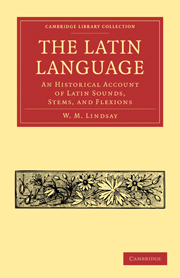Book contents
- Frontmatter
- PREFACE
- Contents
- LIST OF ABBREVIATIONS
- CHAPTER I THE ALPHABET
- CHAPTER II PRONUNCIATION
- CHAPTER III ACCENTUATION
- CHAPTER IV THE LATIN REPRESENTATIVES OF THE INDO-EUROPEAN SOUNDS
- CHAPTER V FORMATION OF NOUN AND ADJECTIVE STEMS
- CHAPTER VI DECLENSION OF NOUNS AND ADJECTIVES. COMPARISON OF ADJECTIVES. NUMERALS
- CHAPTER VII THE PRONOUNS
- CHAPTER VIII THE VERB
- CHAPTER IX ADVERBS AND PREPOSITIONS
- CHAPTER X CONJUNCTIONS AND INTERJECTIONS
- INDEX
- ADDENDA ET CORRIGENDA
CHAPTER II - PRONUNCIATION
Published online by Cambridge University Press: 05 August 2011
- Frontmatter
- PREFACE
- Contents
- LIST OF ABBREVIATIONS
- CHAPTER I THE ALPHABET
- CHAPTER II PRONUNCIATION
- CHAPTER III ACCENTUATION
- CHAPTER IV THE LATIN REPRESENTATIVES OF THE INDO-EUROPEAN SOUNDS
- CHAPTER V FORMATION OF NOUN AND ADJECTIVE STEMS
- CHAPTER VI DECLENSION OF NOUNS AND ADJECTIVES. COMPARISON OF ADJECTIVES. NUMERALS
- CHAPTER VII THE PRONOUNS
- CHAPTER VIII THE VERB
- CHAPTER IX ADVERBS AND PREPOSITIONS
- CHAPTER X CONJUNCTIONS AND INTERJECTIONS
- INDEX
- ADDENDA ET CORRIGENDA
Summary
§ 1. A. In the words ‘man,’ ‘father,’ the vowels which we are in the habit of classing roughly as ‘short a’ and ‘long a’ are really very different from each other, and would be phonetically expressed by two distinct symbols. In Sweet's Handbook of Phonetics, while the second is written a, the first is denoted by a combination of the letters a and e, viz. æ, a symbol which implies that the vowel has something of the nature of an E-sound. If we compare our pronunciation of the words ‘man,’ ‘hat,’ with the German of ‘Mann,’ ‘er hat,’ we see that the German vowel is the same as the a of English ‘father’ or German ‘Vater,’ while we might say that our ‘man,’ ‘hat,’ ‘bat,’ have in them something of the sound of ‘men,’ ‘bet,’ Seelmamx, who classifies the varieties of A as ‘normal a,’ ‘a inclined to an E-sound,’ and ‘a inclined to an O-sound’ (this last being something not quite so definitely an O-sound as the vowel of our words ‘all,’ ‘awe’), is of opinion that the Latin a had a leaning to e rather than to o, and goes so far as to give to Latin a of the Imperial age the œ-sound of English ‘man.’
- Type
- Chapter
- Information
- The Latin LanguageAn Historical Account of Latin Sounds, Stems, and Flexions, pp. 13 - 147Publisher: Cambridge University PressPrint publication year: 2010First published in: 1894



